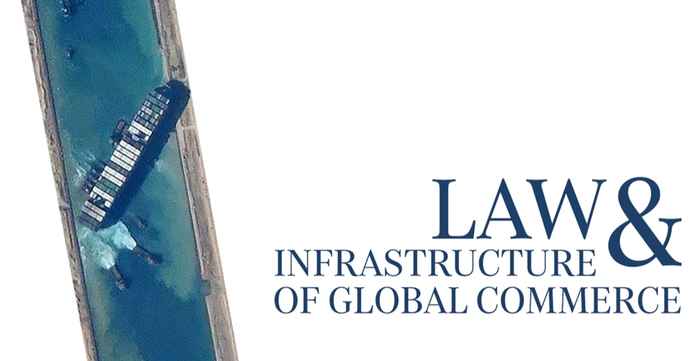Law and the Infrastructure of Global Commerce
- Start date
- 7 July 2022
- End date
- 8 July 2022
- Time
- 08:30
- Location
- Roeterseilandcampus - building A
- Room
- A2.10 on Thursday and A2.11 on Friday

Theme: Infrastructures of Global Value Chains (GVCs)
Global value chains are animated by management strategies that make use of the unevenness and fragmentation of the global regulatory space. Such offshoring and outsourcing are however conditioned upon the existence or establishment of certain infrastructures that make just-in-time circulation of raw materials, goods, labor, information and capital ‘frictionless’ and cost-efficient. These infrastructures that currently enable the largest part of production and extraction of resources globally, range from logistic devices (like containers, ports, and cargo ships) through epistemic and bureaucratic practices (like auditing and supply chain IT) to large-scale geopolitical strategies (like the Chinese Belt and Road initiative) and form a backbone of contemporary capitalism. The centrality of infrastructure is best illustrated when it stutters, as during workers’ strikes and anti-oil blockades, or in the various instances of value chain disruptions during the Covid-19 pandemic, such as the emblematic case of the blockage of the Suez Canal by the grounded container ship Ever Given in 2021.
Against the conventional assumption of infrastructure and logistics being mundane and passive facilitators of exchange, there is growing awareness that infrastructure is ‘where the action is’ – it actively shapes global trade, both its normative underpinnings and material outcomes. Socio-legal scholarship adopting perspectives of ‘Legal Materiality’ and Science-and-Technology-Studies (STS) as well as ethnographic accounts of logistics have recently provided illustrations of how infrastructure brings about a certain reality and normative idea of global commerce. It reshuffles the global economic order, carries an imprint of an ideology of free trade and creates new types of vulnerabilities when it molds territories and lives around it. As such, infrastructures are distributive arrangements with effects on racial, gender, and overall core-periphery injustice that further sustain and reinforces global structures of (colonial) economic and political domination and subordination.
Perspective: Entanglements between law and infrastructures
Infrastructure’s relation to law and normativity is recursive: Infrastructure can be the target of regulation and be required to follow certain normative constraints. At the same time, infrastructure may be understood as regulation, as it sets in motion certain technical, logistical or managerial processes that entail normative orientations, such as favoring seamless and speedy delivery of commodities over a careful assessment of externalities. Moreover, infrastructures endow subjects involved in supply chains with different degrees of agency.
With this conference, we are interested in exploring the entanglements between law and the different elements of infrastructure that underlie global value chains. What conceptions of law can capture the role of infrastructure, its regulation, as well as normative and material implications? What effects does upholding the circulatory system and adding to its resilience, a current political priority of regulators around the world, have on sustainability, labor, and human rights? How is the expansion and consolidation of infrastructure regulating life of both humans and non-humans? What space exists for legal and non-legal contestation and resistance, and where do we see such resistance being exercised in the complex material and immaterial labyrinth that are transnational commercial relations?
Sponsors
The conference is supported by the Sectorplan ‘Transformative Effects of Globalization and Law’, the ‘Sustainable Global Economic Law’ Research group at the University of Amsterdam, the ‘Globalization & Law Network’ at the University of Maastricht, the Law and Development Research Group at the University of Antwerp, and the PortCityFutures research program (hosted jointly by Erasmus U Rotterdam, Delft U and Leiden U).
